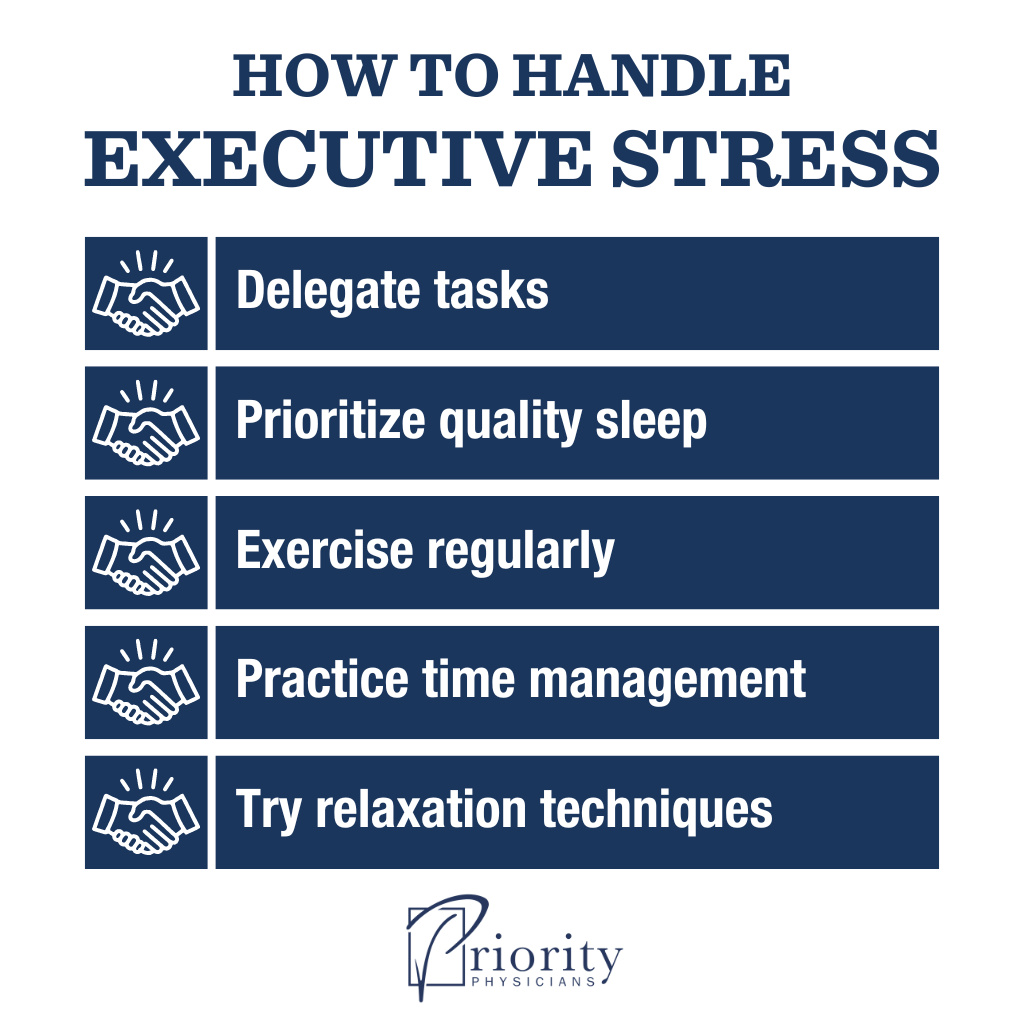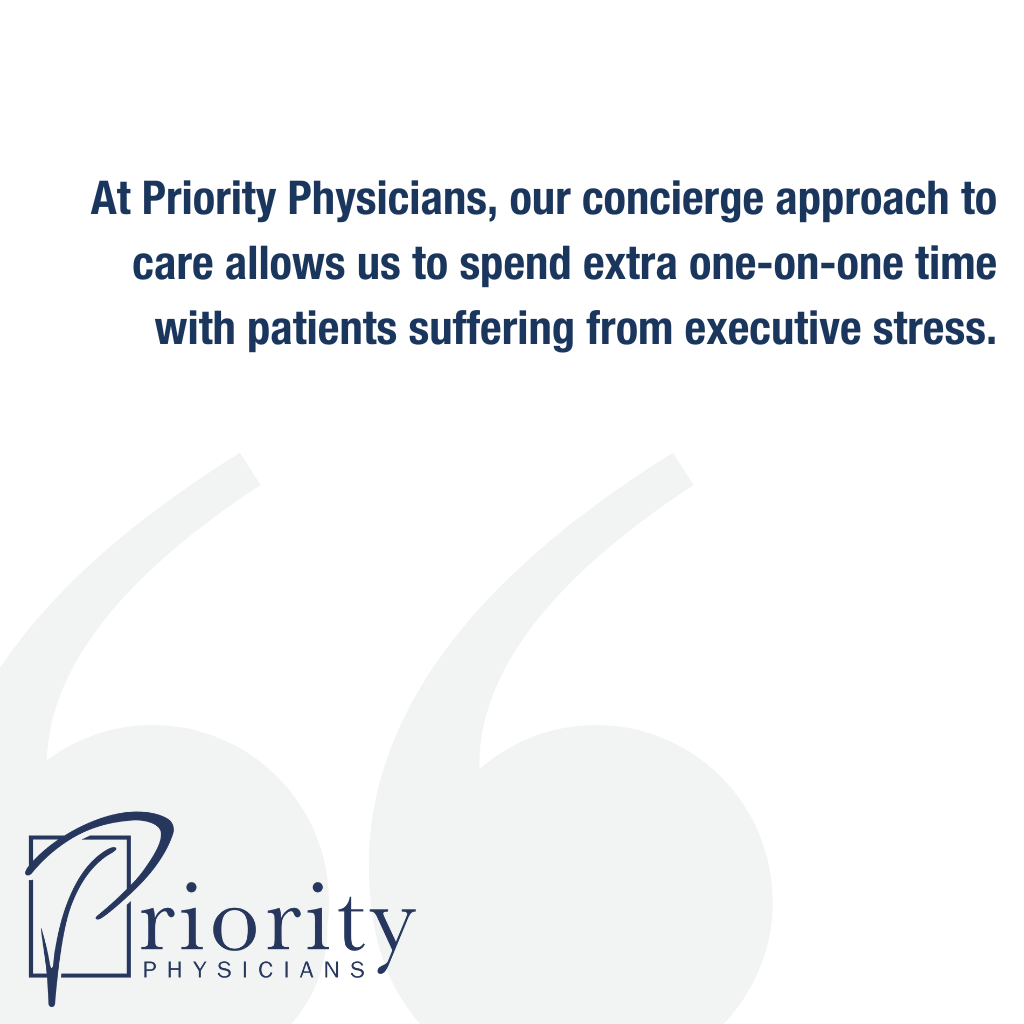We all deal with stress: the college student studying for her next exam, the mother whose child broke his arm, and — of high concern to me as of late — the business executive who also has responsibilities in the home.
Seventy percent of senior leaders say burnout is affecting their ability to make decisions, and 69% of executives are considering quitting because of their well-being, according to global data collected in 2022. Many of my own patients are senior leaders, and their stress is so apparent to me that I’ve given it its own name: executive stress.
Executive stress may not be avoidable, but it is manageable with the right care. Because I operate in a concierge setting, I’m able to spend extra time with my patients — much more than a traditional primary care physician can — to learn where their executive stress comes from, what it impacts, and how to manage it.
Let’s explore executive stress, how it develops, and how you and your physician can manage it.

Understanding Executive Stress
Executive stress is emotional pressure experienced by both men and women in upper- and middle-management roles who also juggle responsibilities in the home.
Not only are these leaders responsible for the success of their companies and employees, they’re also responsible in some measure for the well-being of their families. The high expectations placed upon them exacerbate their mental tension, leading to executive stress.
Many of my patients in executive roles tend to downplay their stress. They often think their success implies a natural ability to handle challenges effortlessly — ergo, their stress goes unaddressed, and their physical health suffers for it.
How Executive Stress Affects the Body
Your body’s stress response begins in the brain, triggering a series of physiological reactions. When faced with stress, your brain triggers the release of cortisol, adrenaline, and other hormones that prepare the body for its “fight or flight” response.
Adrenaline specifically pumps more blood to the heart, which can help us work under pressure. Some of our greatest ideas come to light when we’re stressed, so this isn’t a response we want to eliminate altogether.
That said, the line between a healthy amount of stress and too much stress can blur when you’re in a leadership role. There’s a reason heart attacks are most common on Mondays — executive stress.
Outside of heart attacks, chronic (long-term) stress has detrimental effects on your health and well-being, leading to:
- Hypertension (high blood pressure)
- Weakened immune function
- Depression and anxiety
- Increased heart rate
- Digestive issues (nausea, vomiting, diarrhea)
- Poor sleep quality
- Changes in eating patterns (over- or under-eating)
- Difficulty concentrating
- Mood swings
Recognizing the signs and symptoms of executive stress can empower you to address its underlying causes and manage its impact on your health.
How Executive Stress Affects the Workplace
Executive stress isn’t just an internal response. It can also damage your career growth, performance, and personal fulfillment. When you’re stressed for a long time, making decisions, solving problems, and coming up with creative ideas can be difficult.
Furthermore, when executives feel overwhelmed, their colleagues and employees feel it, too. Executive stress can spur conflict, hurt productivity, and reduce happiness throughout the company.
Taking charge of executive stress and understanding your triggers can prevent burnout, increasing productivity and career satisfaction throughout your entire workplace.
Strategies for Managing Executive Stress
As an executive, prioritizing your own well-being is just as important as taking care of your employees. Building a healthy organization starts at the top.
Developing effective coping strategies to manage executive stress promotes an environment that focuses on self-care and creates a foundation for success and happiness — and it starts with speaking to your physician.
Everyone experiences stress, doctors included. We know how overwhelming it is when others rely on you for guidance both in the workplace and at home, and we’re happy to offer useful advice and medical support.
How Direct Primary Care Can Help Manage Executive Stress
At Priority Physicians, our concierge approach to care allows us to spend extra one-on-one time with patients suffering from executive stress. We offer same-day visits, phone calls, and longer regular appointments.
As a member of our practice, you have the time and flexibility to discuss your concerns in depth, complete a thorough executive physical exam and testing, and establish a strong relationship with your doctor.
With a dedicated care team that goes above and beyond to help manage your stress, you and your doctor can develop a plan tailored to your individual needs.

Building Coping Skills in High-Pressure Environments
To manage your executive stress, your physician may recommend that you:
- Delegate tasks: Assigning tasks to others reduces your workload. It also gives others a chance to develop fresh skills and take on new responsibilities.
- Prioritize quality sleep: Establishing a consistent sleep routine can prevent brain fog, improve your mood, and strengthen your physical health.
- Exercise regularly: Exercise releases endorphins, which can relieve stress. Pairing exercise with a healthy, balanced diet helps reduce cortisol levels and blood sugar spikes.
- Practice time management: Focus on the tasks that have the most impact on your company.
- Try relaxation techniques: These can include breathing exercises, progressive muscle relaxation, and mindfulness.
Executive Stress: Final Thoughts
Yes, everyone experiences stress — but that doesn’t mean we can’t do something about it.
At Priority Physicians, we understand how executive stress can affect your professional and personal life. Talk to your doctor for personalized advice on managing executive stress. Remember: Even if you can’t get rid of stress, you can change how you react to it.

